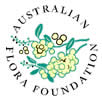Summary of final report on the Australian Flora Foundation funded project:
Mark Tester, Department of Botany, University of Adelaide
These results provide the most thorough documentation published to date of infection in Australian chenopods, a group of plants normally considered to be, at most, weakly mycorrhizal. Plants from both arid and coastal habitats appear to harbour considerable degrees of infection. Experiments with plants grown in pots suggest that such infection is influenced by neighbouring plants, and that plants grown in isolation from commonly mycorrhizal plants will not be infected. Thus, the infection by mycorrhizal fungi of chenopod shrubs in the field may well be influenced by structure of the community in which those plants are growing.
It is now important to determine the effect of mycorrhizal infection on the growth and survival of chenopod shrubs, as alterations in community structure (such as caused by sheep and rabbit grazing) may affect the vigour of chenopod shrubs in more complex ways than previously realized.
